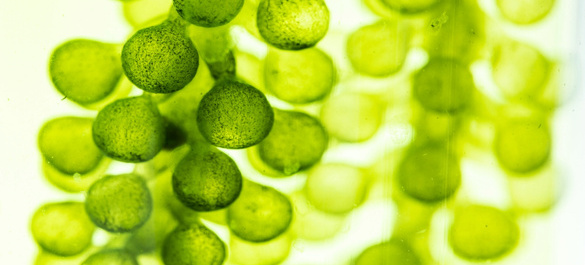
What are Algae?
What are Algae?
Algae are a diverse group of membrane-bound organisms that have a nucleus. They are similar to plants, as they contain a pigment called chlorophyll to photosynthesise (converting sunlight, water and carbon dioxide to oxygen and sugar), but their cells, structure and methods of reproduction are much simpler.
They are predominantly aquatic and can range from tiny single celled organisms to giant kelp, which can grow to 60m long. They can be free-floating or attached to the bottom of the ocean or sea and can exist as single cells or joined together in chains.
Image: Macro microscope closeup shot of green algae water plant iStock/greenleaf123
